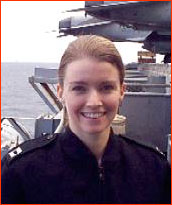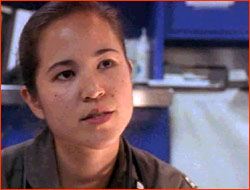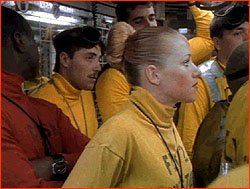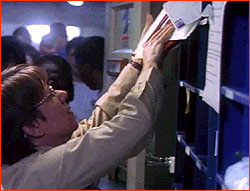 |
 |
 |
Lieutenant Lori Dague graduated from the Naval Academy in 1994. In February, 1999 we spoke with Lieutenant Dague while she was serving as one of 245 women out of a total crew of 5,000 on the U.S.S. Enterprise aircraft carrier in the Mediterranean. Lieutenant Dague is a Communication Security Material Systems Officer and also stands watch as a Tactical Action Officer. Find out her thoughts on women in the military, and life aboard an aircraft carrier. NOVA: What made you want to serve in the Navy? DAGUE: My family, I would say, my parents probably most of all. I am from a pretty patriotic family. My grandfather was a pilot in the Air Force. I didn't ever meet him, but my Dad talked a lot about him. NOVA: What is it like to be a woman working among so many men? Is it ever difficult? DAGUE: It is always challenging, but I think that is on both sides. And I'm not being flip, because I get asked that a lot. I haven't ever been a man going through it, so it is hard to say what the difference is for any of us, but I think it is challenging for everybody. And rewarding too. For a lot of the ships and the combatants, there hasn't been that many years that women have been on them. I think mostly it is just about awareness, mutual respect, and finding common denominators. What's important is the Navy standard, not what the man standard or what the woman standard is. I think we are doing a pretty good job of that. NOVA: What is challenging about it, specifically?
NOVA: What do you think about the idea that was put forward last summer in Congress that gender training was distracting for men and women and should be ended? DAGUE: I am totally for integrated training. That is the way we are going to fight and that is the way we are going to do our job, and we have to train that way. If we make it an unusual thing for men and women to work together as we train, how much more unusual will it be for them to get to the fleet and learn to work together? When people hit the fleet, hit the ship, we need them to hit the deck running and be ready to go and not have to take more adjustment time. I think to segregate is to say there is something unusual about us, and we don't trust you to learn and get the job done. I think when we integrate we teach each other so much more—that it is possible to work together and, hey, even succeed. At the Academy, we were about 10 percent women. In my class, there were 36 individuals, three women and 33 guys, and we went through all four years. To me it was kind of odd at first, coming from the civilian world, but by the time I got to my ship, I was used to those kinds of percentages. I was used to working side by side with guys and they were used to working with me. We learned that we could do that. NOVA: Have you ever encountered any prejudice? DAGUE: Not blatant. I think you can always see things in people's faces. For me to say that I have never seen that would be a lie. I have. But I have never seen it blatantly, and honestly, you can't change how people think. But as long as it doesn't affect the job that I am doing, that is all that I want. And I think most men and women that I work with want to be recognized for the job that they do. NOVA: Would it be easier if the ratio were more even?
NOVA: Do you think there are any areas where a woman shouldn't be serving, for example, on a submarine? DAGUE: I think my answer to that goes along with what I just said. If somebody meets the standards then they should be in. We can't lower our standards because someone says, "oh, I think we need to lower our standards so this group of people can be in." I think that is wrong and we would only be deceiving ourselves and letting down the quality of our military. If they meet the standards, why should they not be in it? NOVA: Do you think there are different ways that men and women handle the same kind of situation?
NOVA: Do you think an integrated military is a better military? DAGUE: Definitely. To say we only want one thing one way, we are limiting ourselves. NOVA: What are your long-term goals for serving in the military? Do you have a target you are reaching for? DAGUE: Well, I never have, and a lot of people always thought that was so strange. For me, I really believe in focusing on the here and now and doing the best job I can. As an officer, it is definitely my job to help look out for the people that I am in charge of. Obviously you have your eye on the next job you are going to do, or the next higher level you can attain, and how you can be working toward that goal. But I have a three-and-a-half-year-old son and he is really my priority so I am looking forward to getting home on shore duty for a couple of years and spending time with my husband and my son. NOVA: Are you able to communicate with them while you are on the carrier?
NOVA: It sounds like a tough job. DAGUE: It is. A lot of times you will hear people say a carrier is like a floating city. We have almost 5,000 people here on board. You never meet everybody. We've got nuclear reactors on board. An entire engineering department. We've got people running a flight deck and we've got 75 aircraft taking off and landing unbelievably close to each other in all kinds of weather. We've got people driving the ship and keeping us from colliding. We've got people running supplies. Everything from a barber's shop, vending machines, to dispersing, taking care of pay. It is really phenomenal to see all the things that go on every day. And just remember why we do what we do. That is something important for me. Every day I miss my family, I miss my son, but I try to remember why I am doing this. It is for the things that we believe in. We want more for our families. We believe in freedom. We believe in God, country and family. I think most people out here feel that way. We don't always like what we do but we believe in why we did it and we believe the oath that we took to serve. Breakdown of a Battle Group | Women on the Carrier | Behind the Scenes Resources | Transcript | Site Map | Battle Alert Home Editor's Picks | Previous Sites | Join Us/E-mail | TV/Web Schedule About NOVA | Teachers | Site Map | Shop | Jobs | Search | To print PBS Online | NOVA Online | WGBH © | Updated October 2000 |
 Lt. Lori Dague
Lt. Lori Dague
 Aboard the aircraft carrier Independence, Lt. Schnurr is the only woman.
Aboard the aircraft carrier Independence, Lt. Schnurr is the only woman.
 Jennifer Keefer trains to become a plane "handler," or "yellow shirt."
Jennifer Keefer trains to become a plane "handler," or "yellow shirt."
 Women make up 6 percent of the population aboard the aircraft carrier USS Stennis.
Women make up 6 percent of the population aboard the aircraft carrier USS Stennis.
 The arrival of mail aboard an aircraft carrier is a much-anticipated event.
The arrival of mail aboard an aircraft carrier is a much-anticipated event.